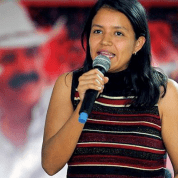When Honduran activist Berta Caceres was assassinated in 2016, thousands of sympathizers across the world united around one rallying call: “Berta vive, la lucha sigue,” or “Berta lives, the struggle continues.”

RELATED:
Exiled Daughter of Slain Honduran Activist Exposes Coup Legacy
Olivia Zuñiga Caceres, Berta’s oldest daughter, is now embodying that call.
Olivia, 28, is running for a seat in Honduras’ National Congress representing the Intibuca department, one of the country’s poorest and most heavily-Indigenous departments. If successful, she will be the first woman and Indigenous person — as well as the youngest — to represent the area.
“It’s important for me to run,” Olivia told teleSUR.
“It’s a form of resistance against the model of racism, colonialism and patriarchy that has been imposed on us.”
Olivia draws inspiration for her electoral bid not only from her mother, but also from Honduran Indigenous hero Lempira, the last cacique of the Lenca people. Lempira, who led the war of resistance against Spanish colonialism, was also from present-day Intibuca.
“It’s one of Honduras’ most rebellious areas,” Olivia said.
“The Lenca people of Intibuca, including my mother, have been some of the most belligerent against foreign invasion.”
Olivia, who represents the leftist Liberty and Refoundation party — known as Libre — is supporting the Opposition Alliance in the general election. The Opposition Alliance is headed by presidential candidate Salvador Nasralla of the Anti-Corruption Party, PAC, and includes Libre and the Innovation and Unity Party, or PINU.
The coalition was created with the intention of ending the monopoly of power the right-wing National Party has maintained on Honduran politics since 2009. That was when former President Manuel Zelaya, who is now the leader of Libre, was ousted in a U.S.-backed military coup.
Under the subsequent National Party administrations of former President Porfirio Lobo and current President Juan Orlando Hernandez, who is running for re-election, the country has taken a turn for the worst.
RELATED:
The Revolutionary Anti-Capitalism of Honduras’ Berta Caceres
At least 123 land and environmental activists have been murdered since 2009, including Berta, according to The Guardian. Meanwhile, hundreds of Black, Indigenous, socialist, LGBT and labor activists have also been murdered.
The ancestral lands of Black and Indigenous groups have increasingly been taken over by private and foreign multinational companies. Many of these areas have been designated as “free trade zones,” allowing companies to pay extremely low wages while eliminating environmental protections.
Consequently, Honduran workers have become poorer and Honduran lands have been destroyed. Those who have opposed these policies, like Berta and slain activist Margarita Murillo, have been met with brutal repression by the National Police and right-wing death squads.
With a local electoral victory, Olivia hopes to transform Intibuca into a base of popular resistance against the current political order. She also hopes that alongside the Opposition Alliance, the country as a whole can advance toward peace, prosperity and self-determination.
“We want a Honduras where women and youth are liberated, where defending human rights doesn’t spell a death sentence and where the government is at the service of the people,” Olivia said.
“We want a government that isn’t controlled by multinationals.”
As the Honduran elections quickly approach, Olivia has stressed the importance of continuing her mother’s legacy. She believes Berta’s fight against environmental destruction, racism and imperialism resonates with oppressed people around the world.
“She was ready to sacrifice her own life. She was able to leave the country but chose to stay and fight,” Olivia said.
RELATED:
‘The Right Wing Is Finished’: Honduran Activist on Elections
“She taught the world how to be brave when fighting monsters and inspired others to remember the importance of fighting these oppressive systems.”
Berta was assassinated on March 3, 2016 in La Esperanza, Intibuca, where she led the struggle to defend the Rio Blanco against construction of a hydroelectric dam. She was an important activist within the Civic Council of Popular Organizations and Honduran Indigenous, known as Copinh, and was the recipient of the 2015 Goldman Environmental Prize.
In early November, an independent commission found that the hydroelectric company that Berta had fought — Energy Development SA, or DESA — plotted with Honduran military and security forces to kill the Indigenous leader.
On Nov. 21, two policemen who allegedly tried to cover up and divert the investigation of Berta’s murder were arrested, according to the country's prosecutor's office.